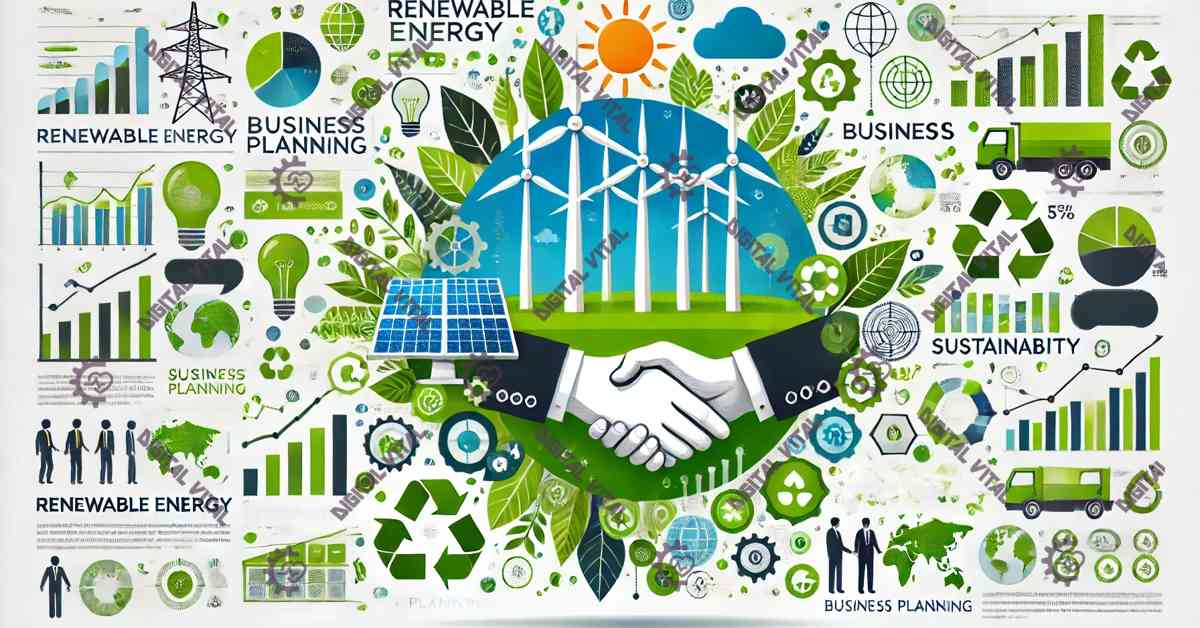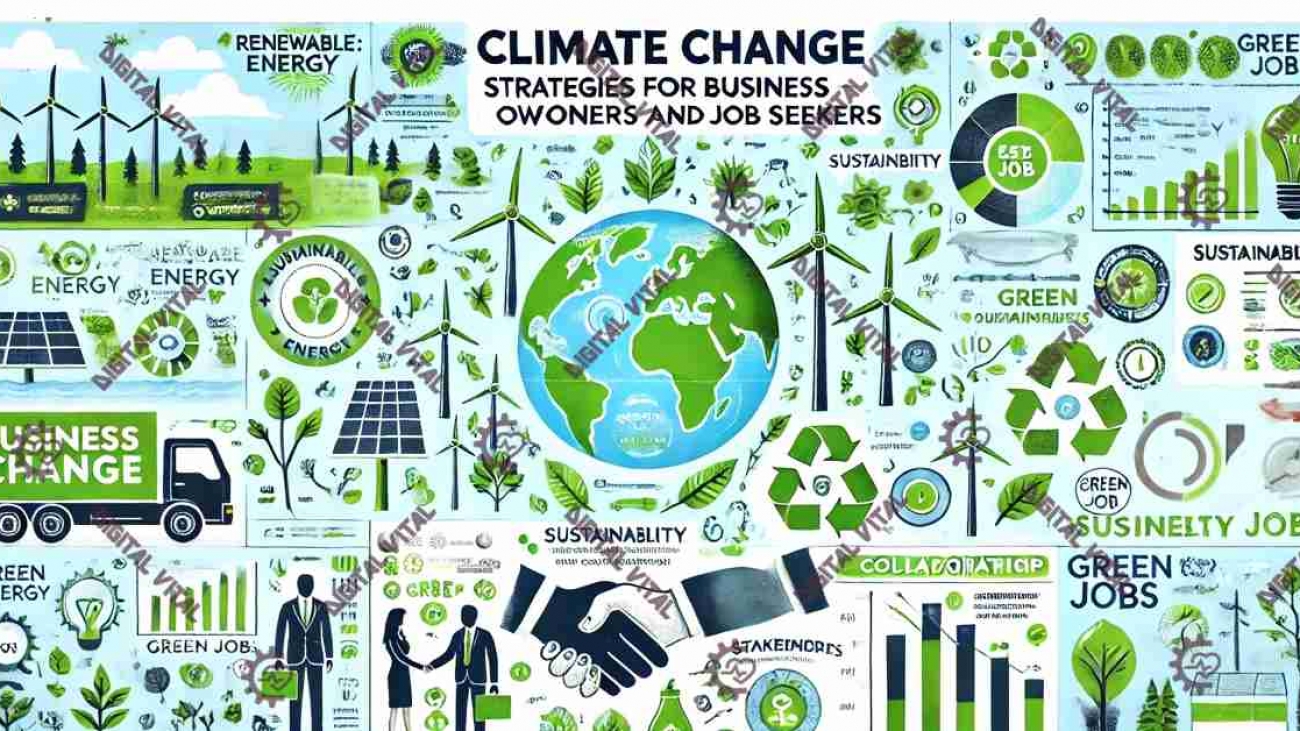Climate change is a defining issue of our time, reshaping industries, economies, and career landscapes. For business owners and job seekers, understanding the implications of climate change and integrating sustainable practices is crucial for long-term success. This article explores the impact of climate change on career development, providing extensive and practical strategies for business owners and job seekers to navigate this evolving landscape.
Keywords: climate change, career development, sustainable careers, green jobs, business strategy, job seekers, sustainability, environmental impact
Table of Contents
Introduction to Climate Change and Career Development
Climate change, driven by human activities such as deforestation, fossil fuel consumption, and industrial emissions, poses significant environmental and socio-economic challenges. Its impact extends beyond environmental degradation, influencing job markets and career opportunities. As the world transitions to a more sustainable future, careers in sustainability and green technologies are becoming increasingly important.
The Changing Job Landscape
The transition towards a sustainable economy is creating new job opportunities while transforming existing roles. Industries such as renewable energy, environmental consulting, and sustainable agriculture are expanding, offering a range of career paths for job seekers. Simultaneously, traditional industries are adapting to integrate sustainable practices, leading to the emergence of green jobs across various sectors.
According to the International Labour Organization (ILO), the green economy could create 24 million new jobs globally by 2030 if the right policies are in place (ILO Green Jobs). This shift underscores the importance of aligning career development with sustainability goals.
Strategies for Business Owners
For business owners, integrating sustainable practices is not only an ethical imperative but also a strategic advantage. Here are some strategies to align business operations with climate change mitigation and sustainability:

Incorporate Sustainability into Business Models
Incorporating sustainability into business models involves rethinking traditional practices and embracing eco-friendly alternatives. This can include reducing energy consumption, minimizing waste, and sourcing sustainable materials. By adopting a circular economy approach, businesses can design products and processes that prioritize resource efficiency and waste reduction.
Businesses can also obtain sustainability certifications, such as ISO 14001, to demonstrate their commitment to environmental management. These certifications can enhance brand reputation and attract eco-conscious consumers (ISO 14001 Certification).
Invest in Renewable Energy
Investing in renewable energy sources, such as solar and wind power, can significantly reduce a company’s carbon footprint and operational costs. Renewable energy not only supports climate change mitigation but also provides long-term economic benefits. Companies like Google and Apple have set ambitious goals to power their operations entirely with renewable energy (Google Sustainability).
Business owners can explore options such as installing solar panels on company premises or purchasing renewable energy credits to offset their carbon emissions. Government incentives and subsidies can further support these investments, making renewable energy adoption more feasible for businesses of all sizes.
Foster a Culture of Sustainability
Creating a culture of sustainability within the organization is crucial for long-term success. Business owners should engage employees in sustainability initiatives and encourage eco-friendly practices in the workplace. This can include promoting recycling programs, reducing paper usage, and encouraging the use of public transportation or carpooling.
Training and education programs can also help employees understand the importance of sustainability and how their roles contribute to the company’s environmental goals. Recognizing and rewarding sustainable behaviors can further motivate employees to adopt eco-friendly practices.
Collaborate with Stakeholders
Collaboration with stakeholders, including suppliers, customers, and industry peers, is essential for driving sustainable change. Business owners can work with suppliers to ensure that raw materials are sourced sustainably and that supply chain operations minimize environmental impact. Engaging customers in sustainability efforts through transparent communication and eco-friendly product offerings can enhance brand loyalty and customer satisfaction.
Participating in industry initiatives and collaborating with other businesses to share best practices and resources can amplify the impact of sustainability efforts. Organizations such as the United Nations Global Compact provide platforms for businesses to collaborate on sustainability goals (UN Global Compact).
Implement Sustainable Innovations
Embracing innovation is key to staying competitive in a rapidly evolving market. Business owners should explore sustainable innovations that can enhance operational efficiency and reduce environmental impact. This can include adopting energy-efficient technologies, developing eco-friendly products, and utilizing data analytics to optimize resource use.
Investing in research and development (R&D) can drive the discovery of new sustainable solutions and create a competitive edge. Companies like Tesla have revolutionized the automotive industry by pioneering electric vehicles and sustainable energy solutions.
Strategies for Job Seekers
For job seekers, the shift towards a sustainable economy presents unique opportunities to build meaningful and impactful careers. Here are some strategies to navigate the job market and develop a career aligned with climate change mitigation and sustainability:

Identify Green Job Opportunities
Green jobs are roles that contribute to preserving or restoring the environment, whether in traditional sectors such as manufacturing and construction or in emerging green industries like renewable energy and environmental consulting. Job seekers should identify and target green job opportunities that align with their skills and interests.
Websites such as Green Jobs Online (Green Jobs Online) and the Environmental Jobs Directory (Environmental Jobs Directory) provide listings of green job openings across various sectors. Additionally, organizations like the Environmental Defense Fund offer fellowship programs that provide hands-on experience in sustainability roles (EDF Climate Corps).
Acquire Relevant Skills and Certifications
Acquiring relevant skills and certifications is essential for building a career in sustainability. Job seekers should consider pursuing education and training in fields such as environmental science, renewable energy, sustainable agriculture, and green building. Certifications such as LEED (Leadership in Energy and Environmental Design) for green building professionals and the Certified Energy Manager (CEM) credential for energy management can enhance employability (LEED Certification) (CEM Certification).
Online courses and degree programs from institutions like Coursera, edX, and the Open University offer accessible options for gaining knowledge and skills in sustainability. Research-based Certification Programs offer by ZAMSTEC Academy of Science and Technology can help you accelerate your career journey.
Network with Sustainability Professionals
Networking is a powerful tool for career development. Job seekers should connect with professionals in the sustainability field through industry events, conferences, and professional organizations. Platforms like LinkedIn and industry-specific groups provide opportunities to build connections and stay informed about job openings and industry trends.
Joining professional associations such as the International Society of Sustainability Professionals (ISSP) can provide access to networking events, job boards, and resources for career development (ISSP). Additionally, attending sustainability conferences and workshops can facilitate face-to-face networking and knowledge exchange.
Tailor Your Resume and Cover Letter
Tailoring your resume and cover letter to highlight your sustainability-related skills and experiences can make you a more attractive candidate for green jobs. Emphasize any relevant coursework, certifications, volunteer work, or projects that demonstrate your commitment to sustainability.
Using keywords related to sustainability and climate change in your application materials can also help you pass through applicant tracking systems (ATS) and catch the attention of hiring managers. Including quantifiable achievements, such as energy savings or waste reduction initiatives you’ve led, can further strengthen your application.
Stay Informed About Industry Trends
Staying informed about industry trends and advancements in sustainability is crucial for career development. Job seekers should regularly read industry publications, follow thought leaders on social media, and participate in webinars and online courses to keep their knowledge up to date.
Subscribing to newsletters from organizations like the World Resources Institute (WRI) and the Climate Group (The Climate Group) can provide insights into the latest developments in climate change and sustainability. Additionally, following sustainability blogs and podcasts can offer practical tips and inspiration for building a career in this field.

Practical Tips for Integrating Sustainability into Career Development
Leverage Transferable Skills
Many skills from traditional careers are transferable to green jobs. For example, project management, data analysis, and communication skills are valuable in sustainability roles. Job seekers should identify and highlight these transferable skills in their applications and during interviews.
Volunteer and Gain Experience
Volunteering with environmental organizations or participating in sustainability projects can provide valuable experience and enhance your resume. Many non-profits and community groups offer opportunities to get involved in environmental conservation, renewable energy projects, and climate advocacy.
Consider Internships and Fellowships
Internships and fellowships provide hands-on experience and can be a stepping stone to a full-time career in sustainability. Programs like the EDF Climate Corps and the Clean Energy Leadership Institute (CELI) Fellowship offer practical experience and professional development opportunities in the sustainability field (CELI Fellowship).
Pursue Advanced Education
Pursuing advanced education, such as a master’s degree in environmental science, sustainability, or renewable energy, can provide specialized knowledge and open up advanced career opportunities. Many universities offer programs focused on sustainability, which can provide a solid foundation for a career in this field.
Conclusion
Climate change is reshaping the job market and creating new opportunities for both business owners and job seekers. By integrating sustainable practices and focusing on green job opportunities, individuals and businesses can contribute to climate change mitigation while securing their future success.
For small businesses, employees, job seekers, and students interested in exploring the potential of sustainable careers and climate change mitigation, DigitalVital offers comprehensive services to help you navigate and succeed
in this evolving landscape. Whether you need a CV review, publishing support, or specialized further education, we are here to assist you.
Visit DigitalVital Hub to learn more about our consultancy services, and stay ahead of the curve by integrating the latest advancements in sustainability into your professional toolkit. Explore other articles on our platform to stay updated on the latest trends and insights in climate change and career development.

